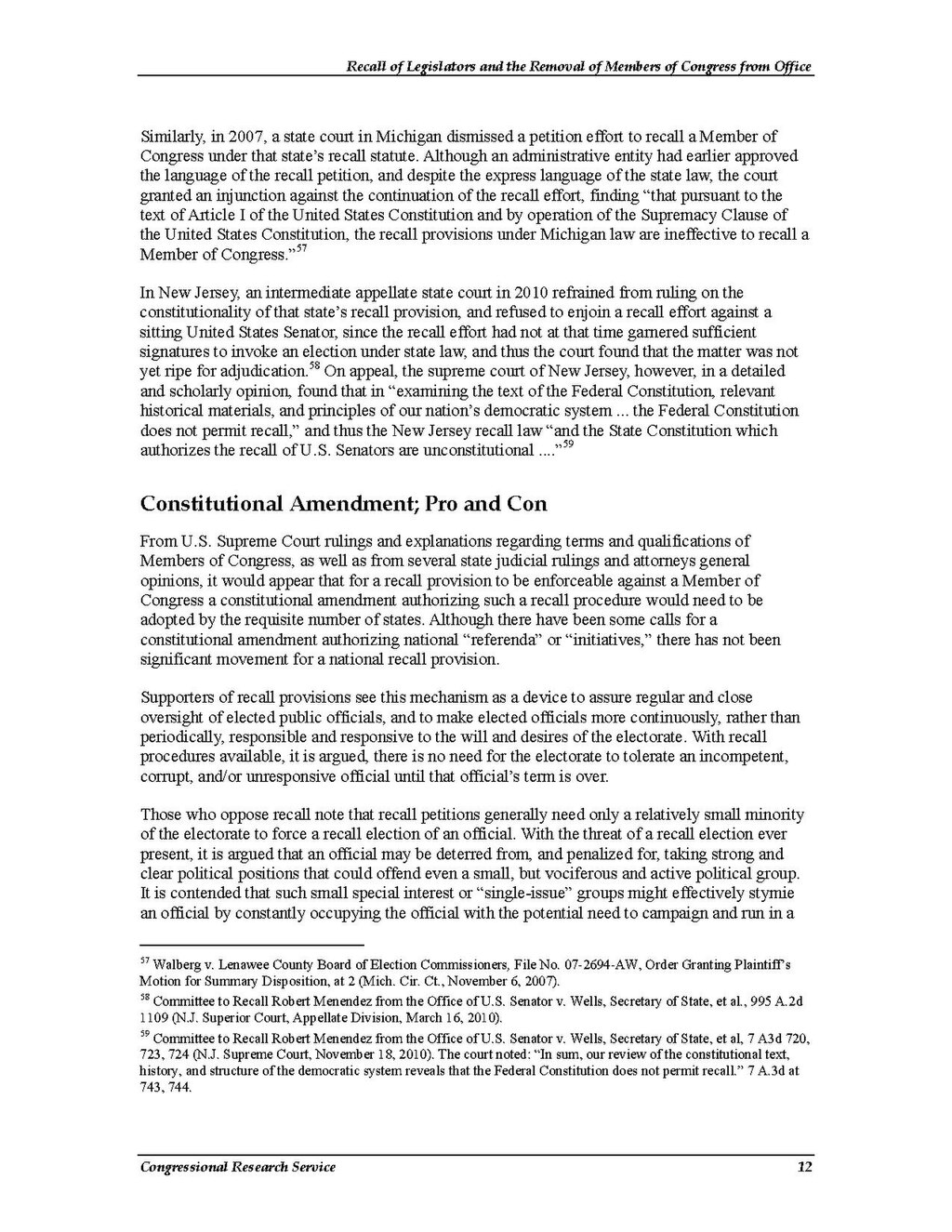Similarly, in 2007, a state court in Michigan dismissed a petition effort to recall a Member of Congress under that state’s recall statute. Although an administrative entity had earlier approved the language of the recall petition, and despite the express language of the state law, the court granted an injunction against the continuation of the recall effort, finding “that pursuant to the text of Article I of the United States Constitution and by operation of the Supremacy Clause of the United States Constitution, the recall provisions under Michigan law are ineffective to recall a Member of Congress.”[1]
In New Jersey, an intermediate appellate state court in 2010 refrained from ruling on the constitutionality of that state’s recall provision, and refused to enjoin a recall effort against a sitting United States Senator, since the recall effort had not at that time garnered sufficient signatures to invoke an election under state law, and thus the court found that the matter was not yet ripe for adjudication.[2] On appeal, the supreme court of New Jersey, however, in a detailed and scholarly opinion, found that in “examining the text of the Federal Constitution, relevant historical materials, and principles of our nation’s democratic system … the Federal Constitution does not permit recall,” and thus the New Jersey recall law “and the State Constitution which authorizes the recall of U.S. Senators are unconstitutional ….”[3]
Constitutional Amendment; Pro and Con
From U.S. Supreme Court rulings and explanations regarding terms and qualifications of Members of Congress, as well as from several state judicial rulings and attorneys general opinions, it would appear that for a recall provision to be enforceable against a Member of Congress a constitutional amendment authorizing such a recall procedure would need to be adopted by the requisite number of states. Although there have been some calls for a constitutional amendment authorizing national “referenda” or “initiatives,” there has not been significant movement for a national recall provision.
Supporters of recall provisions see this mechanism as a device to assure regular and close oversight of elected public officials, and to make elected officials more continuously, rather than periodically, responsible and responsive to the will and desires of the electorate. With recall procedures available, it is argued, there is no need for the electorate to tolerate an incompetent, corrupt, and/or unresponsive official until that official’s term is over.
Those who oppose recall note that recall petitions generally need only a relatively small minority of the electorate to force a recall election of an official. With the threat of a recall election ever present, it is argued that an official may be deterred from, and penalized for, taking strong and clear political positions that could offend even a small, but vociferous and active political group. It is contended that such small special interest or “single-issue” groups might effectively stymie an official by constantly occupying the official with the potential need to campaign and run in a
- ↑ Walberg v. Lenawee County Board of Election Commissioners, File No. 07-2694-AW, Order Granting Plaintiff’s Motion for Summary Disposition, at 2 (Mich. Cir. Ct., November 6, 2007).
- ↑ Committee to Recall Robert Menendez from the Office of U.S. Senator v. Wells, Secretary of State, et al., 995 A.2d 1109 (N.J. Superior Court, Appellate Division, March 16, 2010).
- ↑ Committee to Recall Robert Menendez from the Office of U.S. Senator v. Wells, Secretary of State, et al, 7 A3d 720, 723, 724 (N.J. Supreme Court, November 18, 2010). The court noted: “In sum, our review of the constitutional text, history, and structure of the democratic system reveals that the Federal Constitution does not permit recall.” 7 A.3d at 743, 744.
